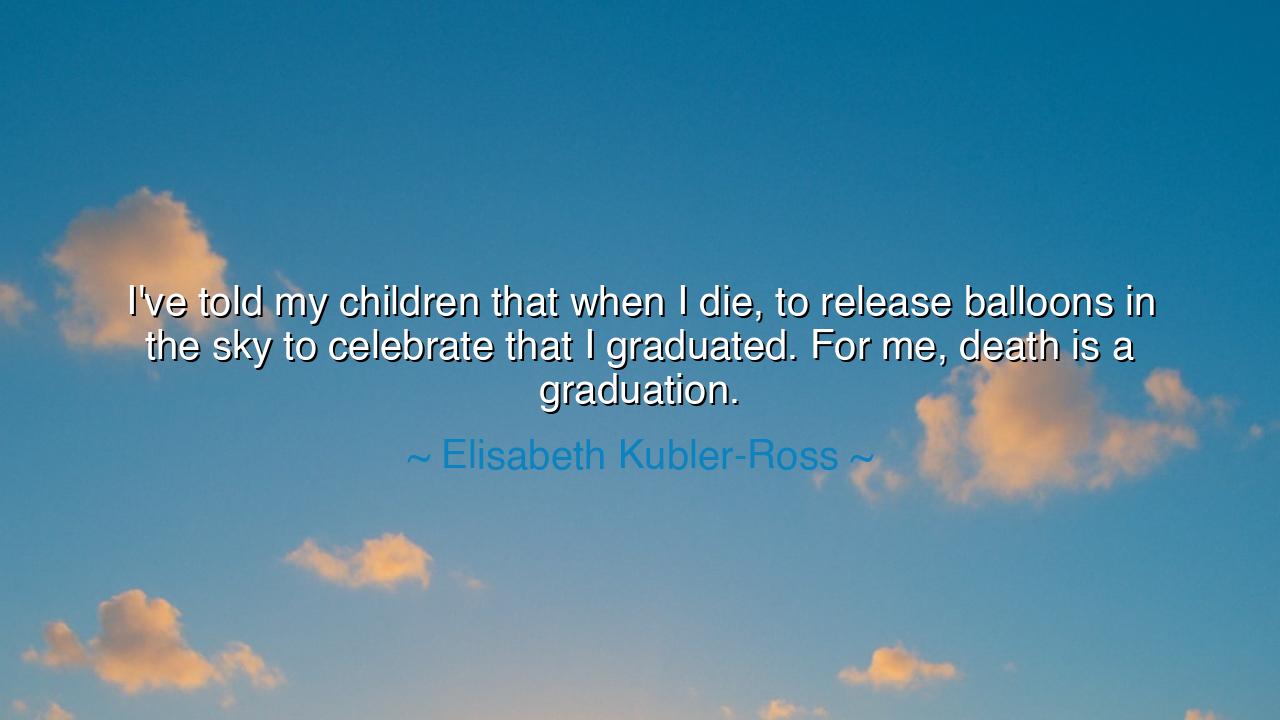
I've told my children that when I die, to release balloons in the
I've told my children that when I die, to release balloons in the sky to celebrate that I graduated. For me, death is a graduation.






In the luminous and soul-stirring words, “I've told my children that when I die, to release balloons in the sky to celebrate that I graduated. For me, death is a graduation,” Elisabeth Kübler-Ross reveals one of the most profound truths of human existence — that death is not an end, but a transformation. Her words are not those of despair, but of peace; not of farewell, but of fulfillment. She speaks as one who has looked beyond the veil of life and seen continuity where others see conclusion. In her wisdom, the final breath is not a fall into darkness, but a commencement into light, the moment when the soul, having learned its lessons, ascends to its higher purpose.
The origin of this quote springs from Kübler-Ross’s lifelong study of mortality and meaning. A Swiss-American psychiatrist and pioneer in the field of thanatology, she changed forever the way humanity speaks of dying through her landmark work On Death and Dying. From thousands of patients standing at the threshold between life and death, she gathered a single radiant insight: that death need not be feared. It is the culmination of our education in love, suffering, and awareness — the soul’s graduation from the earthly classroom. For her, each life is a curriculum, every joy and sorrow a lesson, and the moment of death the final examination through which we pass into freedom.
When Kübler-Ross spoke of releasing balloons into the sky, she was not suggesting a sentimental gesture, but a profound symbol. The balloon, light and untethered, rises toward the heavens as the soul rises beyond the limits of flesh. In this act, she envisioned her children not mourning, but celebrating, for to her, death was not defeat but completion. Just as the student who finishes her studies is not diminished by leaving the classroom, but exalted by what she has learned, so too the human spirit, when it departs this world, carries forward the wisdom gained through the sacred struggle of life.
The ancients, too, understood this truth. The Egyptians called death the “Westing” — the journey into the realm of eternal dawn. The Greeks spoke of it as metamorphosis, the shedding of one form for another. Even the Stoic philosopher Marcus Aurelius wrote, “It is not death that a man should fear, but never beginning to live.” To them, and to Kübler-Ross, the purpose of life was never mere survival, but growth — growth so complete that when the time came to depart, one could do so with gratitude rather than terror. Her view of death as graduation thus harmonizes with the wisdom of ages: that the soul, like a scholar, enters this world to learn, and departs when its learning is done.
In this light, her words are not just about dying, but about living — how to live in such a way that one is ready to graduate with honor. For if death is a graduation, then each day of life is a lesson, and every act of kindness, forgiveness, or courage becomes part of the final examination. Those who live shallowly, chasing possessions or power, will find themselves unprepared for the test. But those who live deeply — who learn to love, to serve, to forgive — will find peace in knowing that they have completed their course with dignity. The wise, Kübler-Ross teaches, live not in fear of endings, but in preparation for transcendence.
Consider, for example, the story of Socrates, who, when condemned to death, drank the hemlock calmly, saying that death was merely the release of the soul from the body’s prison. He called it a journey to truth, not a tragedy. In that moment, like Kübler-Ross, he saw death as graduation — the fulfillment of life’s purpose, not its erasure. Such souls remind us that the goal is not to avoid death, but to live so meaningfully that its arrival feels like commencement, not catastrophe.
The lesson in Kübler-Ross’s words is profound: live in such a way that your final day is not an interruption, but a completion. See life not as a battle to be won, but as a school to be attended faithfully. Every joy, every sorrow, every relationship, every loss — all are teachers. And when your studies are done, depart not in fear, but in celebration, knowing that you have graduated with wisdom written upon your soul.
The practical action is this: cultivate acceptance, practice compassion, and live each day as a lesson in love. Let go of the illusion of permanence, and you will find freedom. Do not cling to life as possession, but embrace it as pilgrimage. When the time comes, may your loved ones, like the children of Elisabeth Kübler-Ross, release their balloons into the sky — not in grief, but in reverence — for a soul that has completed its sacred course and gone onward, not to an ending, but to a higher beginning.






AAdministratorAdministrator
Welcome, honored guests. Please leave a comment, we will respond soon